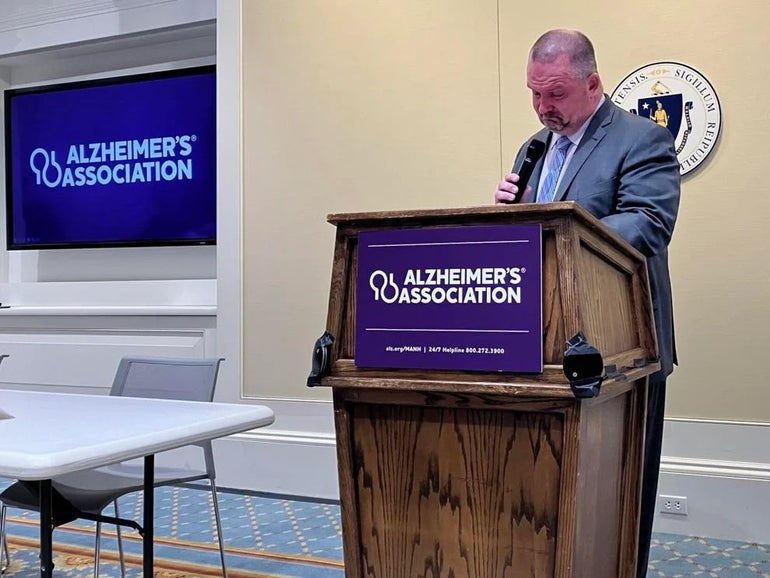Encouraged by federal approval of two new drugs to slow the progression of Alzheimer’s disease and a third treatment in the pipeline, advocates called Wednesday for an overhaul of the health care infrastructure in Massachusetts to keep up with the changing medical landscape.
Early detection is critical to ensure people can qualify for the drugs, advocates and medical experts said, as they also pressed for insurance coverage of expensive biomarker testing to help identify the best treatments for patients.
“Our health care system and our public health care system is woefully, woefully underprepared and underresourced. We’ve got to change that,” Jim Wessler, CEO of the Massachusetts and New Hampshire chapters of the Alzheimer’s Association, said at a briefing hosted by the organization. “We can’t have the tease of beginning to have significant treatments but the majority of the Massachusetts residents who are eligible don’t have access. We’ve got to change that.”
Some 130,000 Massachusetts residents were living with Alzheimer’s disease in 2020. By 2025, that figure is expected to climb by more than 15 percent to 150,000, according to the Alzheimer’s Association.
Massachusetts is also “woefully short” of dementia care providers, Wessler said.
Majority Leader Michael Moran, whose mother died two years ago after a nine-year battle with Alzheimer’s, paused during his remarks and fought back tears as he spoke about his personal connection to the disease.
“It’s a horrible disease, as you all know,” Moran said. “Our goal is moving forward, that we continue this campaign to eradicate this disease from this earth.”
The association said most of its legislative priorities are advancing following favorable committee reports. Those bills include measures to grow the dementia and direct care workforce, build public awareness of Alzheimer’s, extend support to people with early-onset Alzheimer’s, and improve comprehensive care planning and treatment to curb unnecessary hospitalizations.
The association’s new legislative priority — providing insurance coverage for biomarker testing to support early detection and diagnosis — remains before the Joint Committee on Financial Services. The tests, which are also touted by cancer care advocates to provide more precise treatment, can cost hundreds or thousands of dollars.
The fate of the biomarker bills filed by Rep. Meghan Kilcoyne and Sen. Susan Moran (H 1074 / S 689) may not be decided until mid-May, under an extension order the House adopted on Feb. 8 that’s still awaiting agreement from the Senate.
Joe Montminy said he was diagnosed with younger-onset Alzheimer’s disease six years ago, when he was 54. At the time, Montminy said he decided to forgo tests — which he described as “very expensive” when paying out of pocket — to determine whether he had protein plaques associated with Alzheimer’s because no drugs were yet available.
That changed last year, he said, when the Food and Drug Administration approved treatments called Leqembi and Aduhelm.
“In July of last year, Medicare said they will help cover the cost of those tests, so I decided to participate in the clinical trials so I could have those more expensive tests done, and I discovered that I do not have the plaques,” Montminy said, adding the results mean he is not eligible for treatments on the market.
If approved, the measures in the bills under consideration “really could have spared myself, my family, my friends a significant amount of emotional distress,” Montminy said.
Providers and advocates predict that biomarker testing will transform the diagnostic landscape in the next several years and ensure providers catch early signs of Alzheimer’s.
“Our public health system needs to be deployed to expand diagnosis so everyone has access,” Wessler said. “Failure to diagnose directly leads to failure to treat.”
Montminy also expressed support for redrafted legislation that would expand access to MassHealth’s Frail Elder Waiver, which currently provides support services to residents ages 60 and older. The Rep. Bruce Ayers bill (H 4433) — reported favorably out of the Joint Committee on Elder Affairs and now before the Joint Committee on Health Care Financing — would make the waiver available to all people diagnosed with younger-onset Alzheimer’s disease regardless of their age.
“All of these services are not covered by MassHealth for somebody living with younger-onset Alzheimer’s under the age of 60, even though somebody aged 60 and over can have the exact same symptoms, exact same diagnosis,” Montminy said.
Expanding care access is “incredibly” cost effective, said Dr. Daniel Press, chief of cognitive neurology at Beth Israel Deaconess Medical Center.
“The goal is to keep people independent, which is both what people with these diseases want and what their families want,” Press said. “If they lose that independence, the cost to Medicaid in the state is two, or three, four times higher than what it is for day programs, for coordinated care and for adult programs to help people stay independent.”

